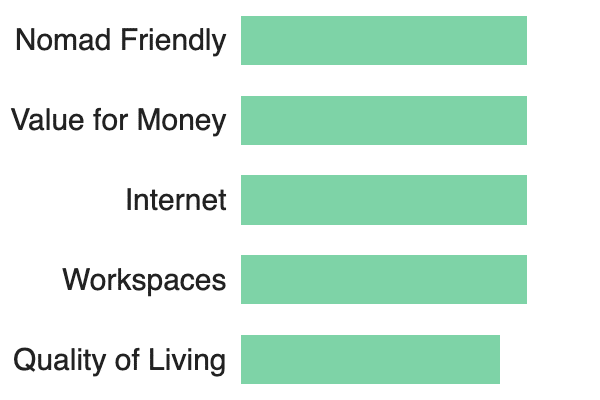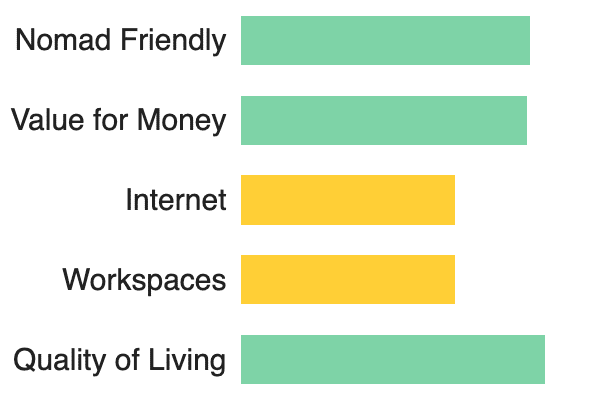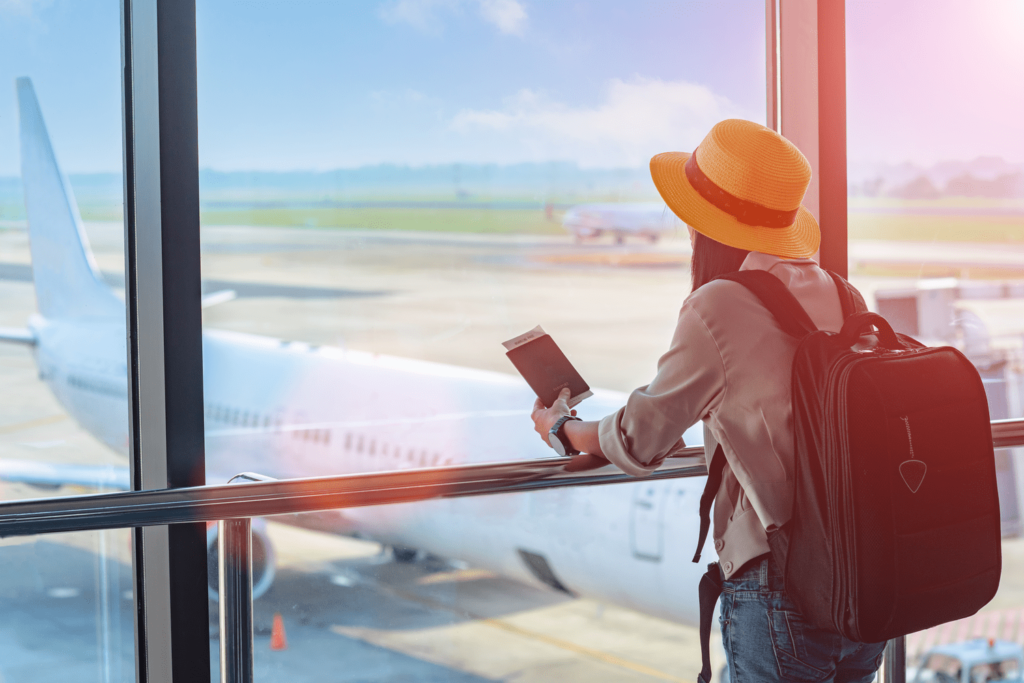
The Effect of COVID-19 on Digital Nomads
Less than 30% of Workers Want to Work From Home Permanently Amidst The Spread Of COVID-19
The spread of the coronavirus has adjusted the working environment for both employer and employees alike, as many are now home working.
Digital Nomad World have undertaken some research, in the form of surveying the general public – both employees and employers – to find out whether this enforced overhaul in the way we work is likely to be a long term solution.
Figures from the Annual Population Survey (APS) suggest that 1.7 million workers within the U.K primarily work from home – around 5% of the UK workforce. It also suggests that up to 8.7 million have worked remotely at one time or another.
Amongst the challenges of remote workers, productivity is often cited as a drawback that employers have concerns about, but the survey we ran suggests that this isn’t the major contributing factor in employees preferring their staff to be office based, where possible:
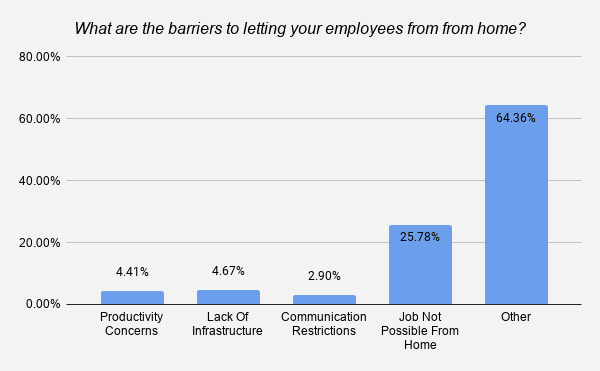
Over a quarter of respondents suggested that their employees were unable to work from home, as it wasn’t possible to undertake it remotely.
The 64.36% of the audience who answered ‘Other’, their responses included:
“I like the day-to-day interaction that an office gives, but home working doesn’t”
“Home working is good here and there, but we need to all be in one place so that we can meet and discuss things regularly – video calls just aren’t the same”
We’ve also run a similar survey, to see whether or not employees enjoy working from home, and if they’d continue to do so once the lockdown restrictions are lifted.
Somewhat surprisingly, the response was overwhelmingly negative – over 70% suggest that they would not like to work remotely permanently – a conflicting view to the hypothesis of many, as prior belief was that it was the employers who would be most reluctant.
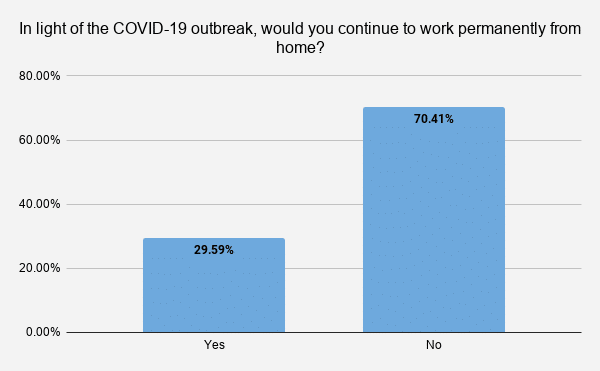
The data suggests that, whilst employers are open to the idea of a remote workforce so long as the infrastructure was there to support it, the majority of those currently working remotely would not like to continue doing so.
A Change Outside Of Work
Whilst the survey data suggests that many aren’t looking for a change to the nuances of their current role, the period of lockdown has seen a surge in interest for people looking to train and improve their skillset.
The graph below shows the surge of interest in online courses, since the lockdown took hold:
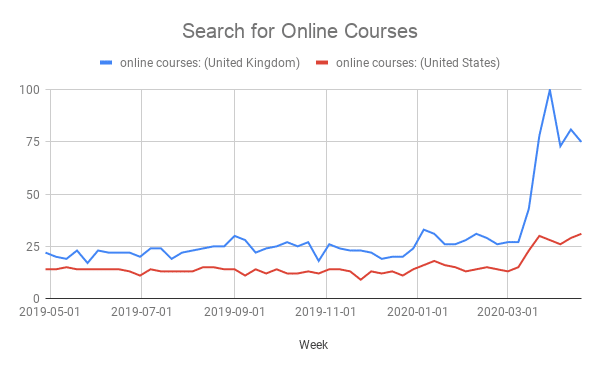
The UK began to see the first cases emerging in February, at which point you see the search trend remaining relatively flat.
However, as the lockdown measures were introduced at the beginning of March, you can see a huge spike in the number of searches for online courses.
In contrast, the US didn’t see any wider emergence of the virus until the beginning of March, and the difference between the two countries is very clear.
A plausible hypothesis between the contrasting trend lines between the UK and the US, is that the UK have furloughed their workforce. Are people in furlough looking to improve their skillset in their own time, outside of official working hours?
One thing is for sure, the world has changed forever – and the employer/employee relationship will need to follow suit in order to keep abreast with worldwide developments.
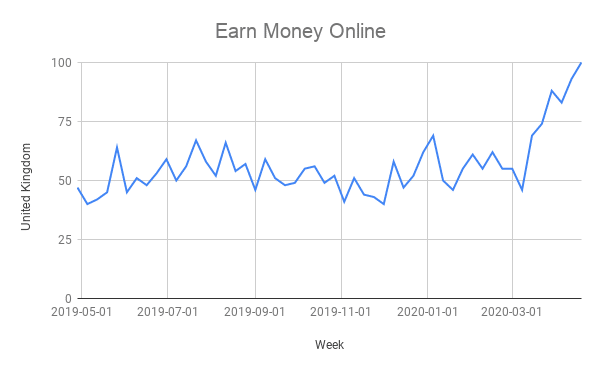
It’s clear that for the majority working from home, they’d prefer to be at the office – but as shown data also suggests that there are many looking for an alternative elsewhere. There’s still a lot of uncertainty around the coronavirus and just how long this could go on for – however early data seems to be giving a bit of an indicator around remote working preferences, but also towards those that may be looking to try something new as they spend time away from the office.
Nomadic Workers Affected Disproportionately by Covid-19
The travel and hospitality industry has encountered a significant slump as a result of the global pandemic we’re facing. Whilst many are struggling, and seeking help from government bailouts, one question that still remains is – how quickly and how effective will any recovery be?
Digital Nomad World have undertaken some research in light of the pandemic, playing a particular interest to nomadic workers.
A study conducted by the Office of National Statistics (ONS), within the UK, has found that of the 5,316 that responded to the survey – 25% has said they have temporarily closed or paused trading in the two weeks prior to 5th April. Of the same audience, only very few have reported to be doing well.
Playing particular interest to digital nomads – those who work from various places across the world, likely in a self-employed or freelance basis, it would appear its very much business as usual in terms of their revenues and workload:
Our survey, screened with the question – ‘Are you a nomadic worker?’ – and only allowing those who answered with a yes,= through to the next question, shows this:
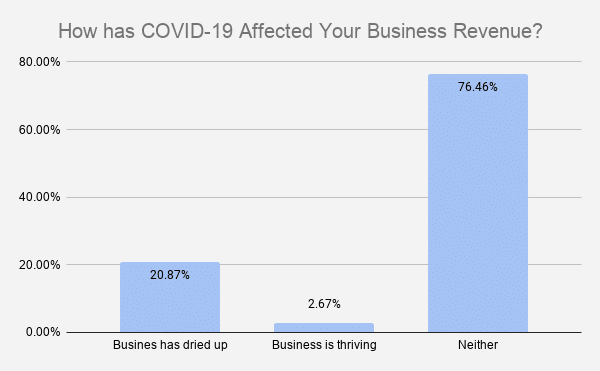
Just over 20% of people said that their business had dried up, with little over 2% responding with entirely the opposite response. However, of great interest is that over 76% of digital nomads reported that it was very much business as usual for them, in terms of their revenues and workload.
One hypothesis is the nature of the roles they’re doing – likely in the digital sector – one that would appear somewhat immune to the economic slump, based on the data collected.
Nomadic workers will typically work from coffee shops, bars, hotels – thus aligning their activity with the trade variations in the hospitality sector.
As expected, searches for ‘coffee shop near me’ have slumped in both the US and the UK since the outbreak of Covid-19. Searches are now around just 25% of what they were at the end of January, as the sector has ceased trading, albeit temporarily.
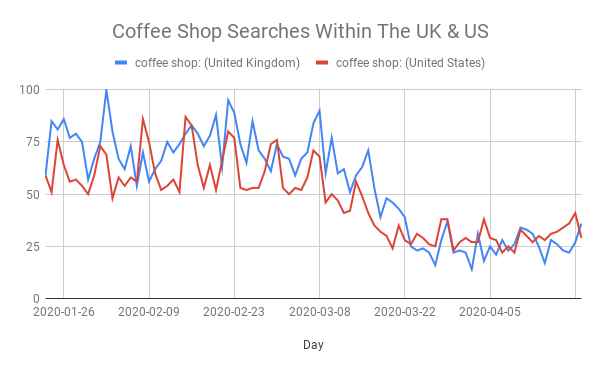
Nomadic workers will often vary their place of work – be it country, town, city and indeed continent.
As such, the reliance on the aviation industry is there for all to see, but with flights grounded altogether, getting around has become a struggle.
Some of the flight schedule changes from March 16th include:
- Italy -73.9%
- China -38.7%
- Germany -30.2%
- UK -19.3
- United States -0.5%
As you can see from the US, even mid-way through March when many in Europe were closing their borders, the industry was operating as normal. The worldwide aviation downturn didn’t end there however:
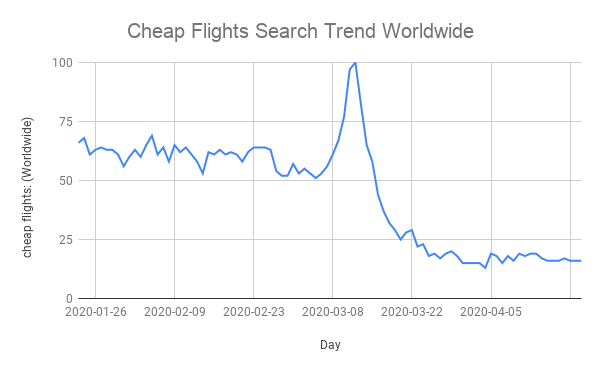 Google searches for cheap flights peaked at the start of March, but then took a major downturn thereafter – the figure at less than 20% of what it was when it peaked.
Google searches for cheap flights peaked at the start of March, but then took a major downturn thereafter – the figure at less than 20% of what it was when it peaked.
With parts of Europe starting to ease their lockdown measures, and Covid-19 cases starting to decrease in some locations – Google Trend data indicates that consumers are becoming more active in their research of the industry, ready for when restrictions are lifted:
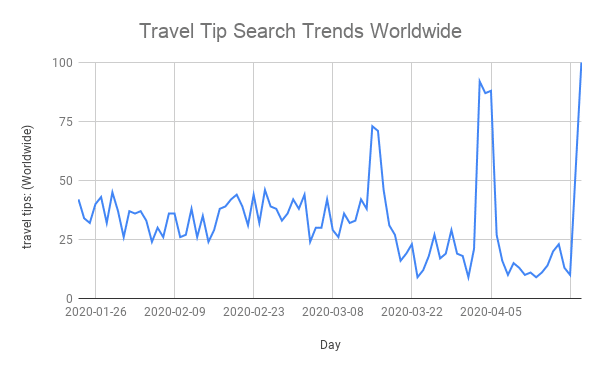 Travel tip related searches are currently seeing a surge of around 500% in comparison to the start of April – an indicator that many are getting itchy feet in their quest to move.
Travel tip related searches are currently seeing a surge of around 500% in comparison to the start of April – an indicator that many are getting itchy feet in their quest to move.
Whilst industries have been battered across the globe, and a worldwide economic recession is imminent, one thing is for sure – nomadic working is a sector that hasn’t seen the downturn that others have. Whilst their working locations may have had to remain the same, for the time being at least – so too have their revenues and their business activity.
The digital industry is core, and this data suggests no different.



